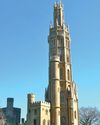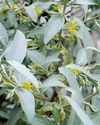
Eleven generations of Treleven Haysom’s family have been working with Purbeck stone in Dorset since 1698.
Still today, his Langton Matravers quarry provides the finest English stone for buildings from Westminster Abbey to Windsor Castle.
In late Jurassic times, around 150 million years ago, the sea covered what is now south Dorset with beds of limestone.
First, Portland stone was laid down, followed by Purbeck stone, as the sea turned into a lagoon. The uppermost bed of all was called Purbeck Marble.
Throughout the Middle Ages, hard, polishable stones, as against softer stones, were called marble and the men who worked them marblers. In medieval England, Purbeck was synonymous with marble in the same way Carrara in Italy has been associated with marble since the Renaissance.
Strictly speaking, Purbeck Marble isn’t in fact marble. Today, scientific geology reserves the term marble for a particular group of metamorphosed limestones.
Still, Purbeck Marble was hugely prized here from the second half of the 12th century. The zenith occurred in the 13th century, before a late-14th-century reduction and an almost complete fizzling out by the end of the 16th century.
The high point is Henry III’s lavish use of Purbeck Marble in his rebuilding of Westminster Abbey in about 1245, complete with the famous Cosmati Pavement and Edward the Confessor’s shrine, where more exotic types of stone were set in Purbeck Marble.
هذه القصة مأخوذة من طبعة January 2021 من The Oldie Magazine.
ابدأ النسخة التجريبية المجانية من Magzter GOLD لمدة 7 أيام للوصول إلى آلاف القصص المتميزة المنسقة وأكثر من 9,000 مجلة وصحيفة.
بالفعل مشترك ? تسجيل الدخول
هذه القصة مأخوذة من طبعة January 2021 من The Oldie Magazine.
ابدأ النسخة التجريبية المجانية من Magzter GOLD لمدة 7 أيام للوصول إلى آلاف القصص المتميزة المنسقة وأكثر من 9,000 مجلة وصحيفة.
بالفعل مشترك? تسجيل الدخول

Travel: Retreat From The World
For his new book, Nat Segnit visited Britain’s quietest monasteries and islands to talk to monks, hermits and recluses

What is... a nail house?
Don’t confuse a nail house with a nail parlour. A nail house is an old house that survives as new building development goes on all around it.

Kent's stairway to heaven
Walter Barton May’s Hadlow Castle is the ultimate Gothic folly

Pursuits
Pursuits

The book that changed the world
On Marcel Proust’s 150th anniversary, A N Wilson praises his masterpiece, an exquisite comedy with no parallel

RIP the playboys of the western world
Charlie Methven mourns his dashing former father-in-law, Luis ‘the Bounder’ Basualdo, last of a dying breed

Arts
Arts

My film family's greatest hits
Downton Abbey producer Gareth Neame follows in the footsteps of his father, grandfather and great-grandmother, a silent-movie star

Books
Books

A lifetime of pin-ups
Barry Humphries still has nightmares about going on stage. He’s always admired the stars who kept battling on